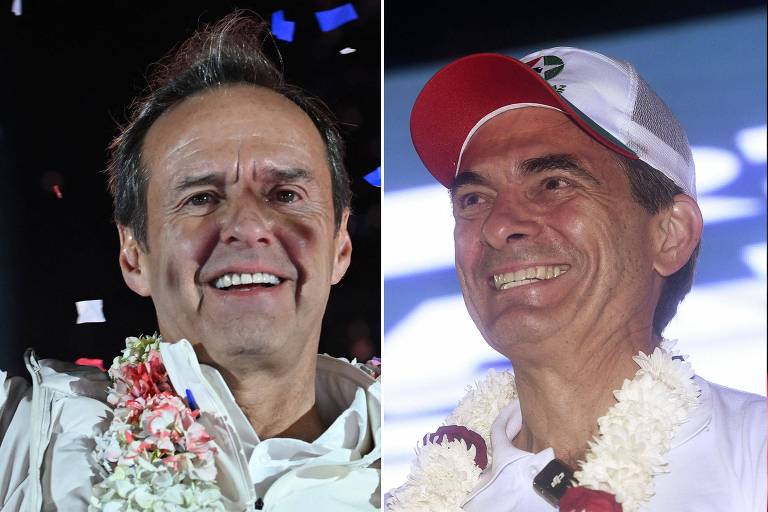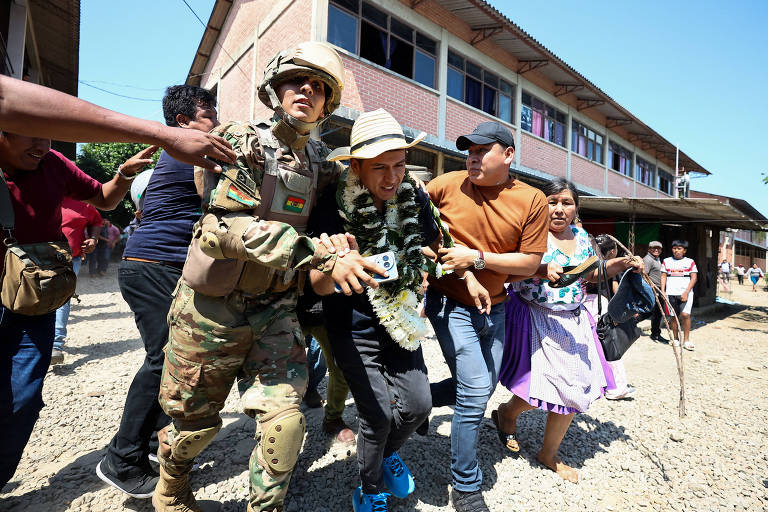Bolivia ends left-wing dominance and will have a runoff with a surprise on the right

For the first time in 20 years, the MAS (Movement Towards Socialism), the party that had former president Evo Morales as its most emblematic figure, will be left out of the race for the Presidency of Bolivia .
Senator Rodrigo Paz Pereira and former president Jorge "Tuto" Quiroga, both from the opposition, will face each other in the second round, according to preliminary data published this Sunday (17) . The total numbers should be known within seven days.
According to electoral authority analysts, data released around 10:20 p.m. (Brasília time) showed Paz Pereira with 32.08%, Quiroga with 26.94%, and Samuel Doria Medina with 19.93%. On the left, Andrónico Rodríguez had 8.11% and Eduardo del Castillo 3.14%. Null votes, defended by Evo, totaled 19%.

Paz Pereira is a surprise, having not previously appeared as a favorite in the polls—ranking third at best. Now, the politician from Tarija (in the south of the country) will attempt to follow in the footsteps of his father, former President Jaime Paz Zamora (1989-1993). The candidate is Bolivian, but was born in Spain when his parents were exiled during the military regime.
As Folha anticipated, the department of Tarija was on its way to establishing itself as a new focus of opposition to Evismo .
The poll favorite, businessman Samuel Doria Medina, who was running for President for the fourth time, came in third place.
After learning the preliminary results, Doria Medina made a statement announcing his support for Paz Pereira. "Throughout the campaign, I said that if I didn't make it to the second round, I would support whoever came first, if it wasn't the MAS. Well, that candidate is Rodrigo Paz, and I stand by my word," he said.
Fragmented, the left suffers a rare defeat. Its best chance of remaining in power was with Andrónico Rodríguez, president of the Senate and a coca-growing leader, who was an ally of Evo but broke with the former president and ran independently.
Since neither candidate secured more than half the vote, or 40%, with a 10-point lead over the second-place candidate, Bolivians will have to return to the polls on October 19. This is also the first time the Andean country will have a runoff election since the 2009 Constitution.
The end of a cycle of elections won by the left in Bolivia reflects the fragility of the MAS, which came to power in 2006 with Evo, but had to go into this year's election lost in internal battles, especially between the former president and the current one, Luis Arce, Evo's former minister who succeeded him and gave up trying to be re-elected .
Evo was barred from running this year. Having fallen out with Arce, whom he accused of taking over the MAS party and working to prevent him from running again, and also alienated from Andrónico, who was once considered his political successor, the former president began to advocate for null and void ballots as an expression of protest.
The left's main adversary in this year's elections, however, was the economy. The government has nearly exhausted its dollar reserves, while gas exports, which played an economic role in supporting poverty reduction and improved living standards, have declined in recent years.
The surge in the exchange rate resulted in record inflation (in July, it reached around 25% in 12 months), as well as fuel shortages and high prices for basic products, increasing popular discontent.
With the negative numbers and the fratricidal war between its main exponents, the left opened space for right-wing candidates who were already known to voters to have an advantage.
"Bolivia needs stability, it needs governability, but it needs to end the 'State of Blockade' so that the State works for us and we for the State, to end injustice and corruption," said Paz Pereira.
Throughout the campaign, he promised to "sweep away corruption." In his first speech after the result, he said that Bolivians "are not asking for a change of government, but a change of political system. This is the beginning of a great transformation."
"This is perhaps the most important election in 40 years. It is the opportunity that democracy gives us: to leave behind division, confrontation, with economic stability, with a different future," said Quiroga, accompanying his vice-presidential candidate, Juan Pablo Velasco, who voted in Santa Cruz de la Sierra.
Later, he celebrated the night as historic. "It's a historic night for all Bolivians. We've taken a giant step toward a better tomorrow. Bolivian democracy has won," he said.
On social media, Evo criticized his opponents and the current president this Sunday morning. "If it weren't for his ally Luis Arce, who stole our party [the MAS] and banned the country's largest political movement, we would have won these elections by a landslide. The spoiled vote expresses our rejection of a rigged election," concluded the coca grower leader, the country's first indigenous president, who celebrates his bicentennial this month .
Andrónico was attacked by critics while voting at a school in Entre Ríos, in the department of Cochabamba. Videos on social media show the candidate surrounded by supporters trying to protect him while people cursed and threw stones as he left the venue, according to the newspaper El Pais. "We fulfilled our democratic vocation by casting our vote today," he wrote on the X after casting his ballot.
"Clearly, these are organized groups that, in an intolerant manner, the moment I arrived, wanted to prevent me from voting. Even so, the population asserted itself and controlled the situation," he told reporters, classifying the episode as an isolated incident.

Whoever wins the election will take office on November 8th for a five-year term. The future government will have to face other pressing issues, such as negotiations over lithium exploration. Furthermore, the coming days will be crucial for demonstrating the new president's ability to form political alliances in Parliament.
For visitors unfamiliar with La Paz 's altitude, the advice is to walk slowly; for voters and those who followed Sunday's elections, walking was one of the only options.
Unlike some Brazilian cities, which offer free transportation to encourage public participation, there was no public transportation, and prior authorization was required to travel by car. Even taxis and ride-hailing apps were restricted, a similar trend in past elections.
Polling stations opened at 9 a.m. (in Brasília) and closed at 4 p.m., with 3,733 locations spread across the country. Voting is mandatory in Bolivia.
On Saturday (16), the Arce government denounced what it called a "dirty war" on social media promoted between opposition candidates and rejected that there could be electoral fraud underway, as opponents pointed out.
uol


%2Fhttps%3A%2F%2Fi.s3.glbimg.com%2Fv1%2FAUTH_59edd422c0c84a879bd37670ae4f538a%2Finternal_photos%2Fbs%2F2025%2F6%2Fa%2F88SAqISamUwXzneNAdtg%2F13608777-1080p-4000k-h264-2ch-128k-44100-aac-1754594941.00-02-52-23.quadro001.jpg&w=3840&q=100)


